Monday, July 31, 2006
Immigration Policies Need to be Re-examined
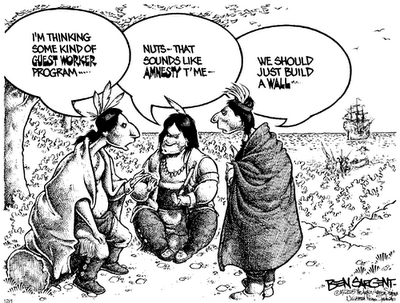 Following my last post on being forced to reconsider hallowed leftwing assumptions on welfare, Jackie Ashley's piece on immigration today does something similar for this fraught policy area. My position, like many others I suspect, has tended to be determined by the views of those I regard as political opponents: Conservatives, National Front, BNP and so forth. As long as they poured out hate and called for things like repatriation, I knew where I stood, or at least, thought I did.
Following my last post on being forced to reconsider hallowed leftwing assumptions on welfare, Jackie Ashley's piece on immigration today does something similar for this fraught policy area. My position, like many others I suspect, has tended to be determined by the views of those I regard as political opponents: Conservatives, National Front, BNP and so forth. As long as they poured out hate and called for things like repatriation, I knew where I stood, or at least, thought I did. A few years back Peter Mandelson suggested Labour take a closer look at immigration; I rather thought he was arguing for more skilful finessing of existing policy. The person who really got me thinking was Frank Field, someone whom I've always respected as transparently honest; he argued immigration policy was 'unsustainable'. Ashley's article completes the process, for me, whereby the case for re-examination is convincingly made. Government estimates of migration from Eastern Europe was 26,000 in advance of the accession of 10 new states in 2004; the actual current figure given by the government is 400,000 and that does not include illegals. Britain is so popular with aspirant immigrants because our welfare rules provide support and our employment rules provide good access to work, even if most of it is low paid.
Ashley points out that an influx of young people, hungry for work, must be good news for an ageing society constantly losing emigrants to sunnier climes. Many anecdotal reports confirm East Europeans are often more available, more efficient and cheaper than our elusive indigenous craftsmen. Good news for the consumer and for service companies seeking cheap labour to do the work our workers no longer wish to do. Not too much to worry about, you might think but this would be far too complacent. Firstly such a huge influx, as Field warns, places a huge burden on welfare services while those immigrants who are black economy workers contribute little or nothing to the common weal. Secondly it tends to crowd out local people from things like housing lists. Not so much middle class people with no need of such services, but poorer people already living in rundown areas which tend to host the new arrivals.
Thirdly, a huge addition to the labour market, at its cheapest end, inexorably pushes down wages still further. For many British people immigrants from Eastern Europe are a bit like those holiday home buyers in rural areas who make things bad for locals who want to buy their own homes. Ashley suggests the topic should be aired at the Manchester conference before arrivals begin from Bulgaria and Romania, warning that 'unless the government starts a debate on this issue, other, darker forces will.'
Sunday, July 30, 2006
Tough US Welfare Reforms Challenges Leftwing Assumptions
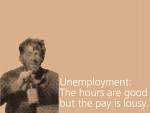 Occasionally, as a fairminded left of centre social scientist(as this is how I like to think of myself), I've encountered evidence which has challenged my basic assumptions. The leader in the Economist and the longer related article inside, did just that. It concerns the step change in US welfare back in 1995 whereby time limits were placed on entitlement to welfare payments. I can remember feeling indignation that as those cruel limits expired thousands of poor people would be condemned to destitution and grimly waited for news of such an acopalypse to arrive from over the Atlantic.
Occasionally, as a fairminded left of centre social scientist(as this is how I like to think of myself), I've encountered evidence which has challenged my basic assumptions. The leader in the Economist and the longer related article inside, did just that. It concerns the step change in US welfare back in 1995 whereby time limits were placed on entitlement to welfare payments. I can remember feeling indignation that as those cruel limits expired thousands of poor people would be condemned to destitution and grimly waited for news of such an acopalypse to arrive from over the Atlantic. Well, news has arrived, but it's not quite as I expected. Welfare rolls have actually fallen from 5 million to 2- millions of those on welfare have found work and poverty has fallen. Studies show that a strong economy has helped with the job finding but 'the main reason for the steep decline in caseloads is the reform itself'. Moreover, fewer people now walk through the door requiring welfare assistance. Most of the jobs taken up are poorly paid, as one might expect, but overall, former claimants are better off than they were on welfare.
Helping the reforms to work are incentives now familiar to the UK like tax credits for low earners and child care assistance, especially helpful for single mothers. Other countries like Denmark and Holland have introduced similar measures and we are told France and Germany are thinking about doing the same. If this shift from 'entitlement to conditionality' really does work as well as these reports suggest, then default welfare thinking on the left will have to be seriously re-examined.
Thursday, July 27, 2006
Top Ten Political Columnists part II

The Context Making a list of top ten political columnists, for a politics junkie like me, is like ranking (another passion) heroic test cricketers. These are the people whose views determine my view of the world, and a great many other people too. So here goes, in reverse order.
10 Peter Wilby This is the former editor of the new Stratesman, who writes frequently for The Guardian and who seems to cut to the heart of issues central to Labour activists e.g. see here.
9 Michael Portillo Much distrusted by the Tories but his very personal analyses-weekly in ST- always interest and inform. He is also very good on This Week, Andrew Neil’s discussion programme. Check his website.
8. Martin Kettle His Saturday column is invariably on a well chosen topic and his crisp analysis well worth the reading for his elegant arguments and sound judgements. See here for his archive.
7. Polly Toynbee Polly has become something of a bete noire for rightwing bloggers as she is held to be such a quintessentially Guardianista. She used to expend quite a bit of energy banging on about New Labour’s achievements but I never minded that. I think she’s excellent on issues like poverty or any topic requiring detailed social policy research. Find her archive here.
6. Max Hastings This somewhat gung ho former editor of the Telegraph and Evening Standard-recently knighted- is an interesting character who can write brilliantly: here's a sample. I occasionally find his default slightly toffee-nosed rightwingery a problem but the force of his writing cannot be denied.
5. Jackie Ashley Jackie's father, Jack was much loved Labour member of the Commons where every speaker faced him to answer his questions to help him counter his total deafness throiugh lip reading. Maybe it's her closeness to the party which enables her to write so well and constructively on its various, now quite acute problems. Read her splendid interview with Melanie Philips here.
4. Mathew D'Ancona A man who took the top first of his year, 1989, at Magdalen in modern history and then was elected a fellow of All Souls is likely to have something to say worth reading; this has been the case since he started writing for the Sunday Telegraph and, since February as editor of the Spectator. Here's a sample of him being entertainingly critical about Red Ken.
3. Timothy Garton Ash Another graduate of Oxford in modern history, this is a renaissance man of a columnist who has written many scholarly books as well as blazingly good articles in the press. He currently writes for the Guardian and is immensely impressive as a dip into his archive will demonstrate.
2. Andrew Rawnsley Very much a broadcaster cum journalist and very good at both, I always find his columns reflect the degree of intense inside knowledge which made his Servants of the People such a brilliant and authoritative read. Check out his archive if you don't believe me.
1. Simon Jenkins One time Times editor the prolific and scholarly Jenkins(knighted in 2004) now writes two articles a week for the Guardian, plus one for the Sunday Times not changing his usual(slightly right of centre?) stance one jot in the process. His recent articles on Iraq, the railways and, most witheringly, New Labour's incompetence are, to me at least, totally convincing. His archive is an education in itself. In my view he is Britain's top political columnist.
Wednesday, July 26, 2006
Top ten Political Columnists Part I

Yes, I know some readers might yawn at yet another list but they do provoke interest and comment and we bloggers love both so here goes.
I have to make some qualifying statements at the outset:
i) I read very widely in general but more particularly, being a left of centre person, The Guardian and Observer. I also read regularly the Sunday Times, Times, Telegraph and the Independent. In addition I consume the weekly Economist which does not usually provide authorship of its excellent articles.
ii) I confess I think the Guardian has the best stable of gifted writers of the quality press and that the rest, overall, don’t really come all that close.
iii) I do read the tabloids quite regularly but apart from Trevor Kavanagh in The Sun and Kevin Maguire in the Mirror, I don’t rate any of them. Indeed most of them would probably make it into my list of worst political columnists, (of which more, perhaps, on a later occasion).
iv) I recognize that there are many gifted journalists out there whose boots I am not fit to lick, but my purpose here is to offer my own, admittedly biased opinion, of how the leading people rank in terms of quality.
v) I recognize that male outnumber female columnists in my list and can only spread my hands and claim I am not being prejudiced in this particular aspect. These just happen to be my list of those I rate the most.
Rankings I offer three categories two of which I do not rank. First I mention the political editors whom I respect as highly authoritative, experienced and readable. Second I offer a ‘second division of ten or so columnists whom I think very good but not quite worthy of the top ten. Finally I offer my top ten columnists. The first two are covered in this post and the third, more important ranking will be given tomorrow.
Political editors/chief political commentators
These wise old birds are usually right on the money when it comes to reading the political game, hence their frequent appearances on news programmes, Newsnight and so forth. I do not attempt to rank them as they seem to me to be of equal merit as journalists who are thoroughly familiar with the topography of British politics and who seldom make a wrong call. By rights all of them should be in any top ten but for my purposes here I limit them to separate category
I do have two favourites: firstly unsurprisingly, is Michael White of The Guardian, who is not only very perceptive and insightful but often very funny with it. He was also a brilliant sketch writer earlier in his career. Secondly, equally wise and perceptive and extraordinarily well informed is Peter Riddell of The Times who has also written some outstanding books. Also reliable are: Steve Richards of the Independent is as well worth reading as he is listening to on his many broadcasting spots on radio and television; and George Jones of The Telegraph; and the occasionally idisyncratic Peter Oborne, political editor of the Spectator and John Kampfner who edits the New Statesman, both highly perceptive journalists who have also written widely elsewhere in the press and in their books.
Next Best Ten Columnists
This group is not ranked as to some extent they are not all comparable. They comprise those whom I rate highly and read regularly but do not quite make my top ten. They are:
Neal Lawson, the chair of Compass, who writes regularly in the Guardian and has been consistently good at thinking where Labour goes from here; Anatole Kaletsky, who writes on economics in The Times;
Mary Riddell who writes in The Observer;
Roy Hattersley who entertains and enlightens in The Guardian;
Mary Ann Sieghart who writes perceptively in The times;
Peter Preston who used to edit the Guardian and still writes a good weekly column;
Boris Johnson, who used to edit the Spectator and now writes entertainingly and when he wants shrewdly in the Telegraph; and finally
Mathew Parris who writes with grace and wit for The Times as well as broadcasting a great deal.
Top Ten tomorrow....
Tuesday, July 25, 2006
On the Origins of the Lebanon War and the Special Relationship
Three points to add to the escalating tragedy in Lebanon.
Firstly a comment(by 'sonofmantex') on my earlier post on this topic last Friday suggested that 'who started it is usually unfruitful and enquiry'. I'm not so sure. Many situations in international relations resemble vacuums of intense tension between highly armed adversaries; the slightest provocation can cause the fatal implosion. In such circumstances it who casts the first stone is highly pertinent. Think of the 1914 when it was an almost chance bullet which plunged the world into a conflict responsible for millions of deaths. Think of Cuba when a wrong move could have destroyed the world and made this or any discussion irrelevant.
Secondly my same commenter referred me to a Noam Chomsky assertion that it was Israel who initiated hostilities by taking two civilians hostage- something which, he argues, the western media have hushed up. The great radical intellectual is not always an infallible guide to the truth but take a peek and see if you found him as pesuasive on this as I did.
Thirdly, an ICM Poll tells us that 63% of Britons consider Blair has tied himself too emphatically to Bush's shirt-tails. This merely confirms what most of us have already divined from conversations with neighbours and the like. My strongest sense of this essentially patriotic sentiment was gained when watching that saccharine movie, Love Actually, when the put-upon British Prime Minister finally turns on an arrogant US president and tells him he's fed up of doing his bidding and has ideas of his own. To my amazement the audience broke out into spontaneous applause. Blair should have been there- it might have helped him keep in touch with the people who put him in Number 10.
Firstly a comment(by 'sonofmantex') on my earlier post on this topic last Friday suggested that 'who started it is usually unfruitful and enquiry'. I'm not so sure. Many situations in international relations resemble vacuums of intense tension between highly armed adversaries; the slightest provocation can cause the fatal implosion. In such circumstances it who casts the first stone is highly pertinent. Think of the 1914 when it was an almost chance bullet which plunged the world into a conflict responsible for millions of deaths. Think of Cuba when a wrong move could have destroyed the world and made this or any discussion irrelevant.
Secondly my same commenter referred me to a Noam Chomsky assertion that it was Israel who initiated hostilities by taking two civilians hostage- something which, he argues, the western media have hushed up. The great radical intellectual is not always an infallible guide to the truth but take a peek and see if you found him as pesuasive on this as I did.
Thirdly, an ICM Poll tells us that 63% of Britons consider Blair has tied himself too emphatically to Bush's shirt-tails. This merely confirms what most of us have already divined from conversations with neighbours and the like. My strongest sense of this essentially patriotic sentiment was gained when watching that saccharine movie, Love Actually, when the put-upon British Prime Minister finally turns on an arrogant US president and tells him he's fed up of doing his bidding and has ideas of his own. To my amazement the audience broke out into spontaneous applause. Blair should have been there- it might have helped him keep in touch with the people who put him in Number 10.
Monday, July 24, 2006
We Must Avoid Being Drawn into a Regional Middle East War

Last Friday, I posted on the war in the Lebanon, criticizing our government's reluctance to censure Israel for continuing to over-react to Hizbullah's original attack. Since then I've read stuff which partly reinforce my view and also challenge its basis. Dealing with the latter first, a comment on my post led me to consult this source. This post on the 'Information Clearing House' site about which I know nothing I should add, claims the 'three week war' on Lebanon by Israel has been planned and cleared by Washington for over a year. This could be, as I suspect, standard Muslim supporting disinformation or there could be something more to it.
The former reinforcement comes via Jackie Ashley whose article today points out that:
i) within the UK, the government is not supported by: much of the rank and file party membership, juniuor foreign minister Kim Howells, a majority of Labour backbenchers, Cameron's deputy and foreign affairs spokesman not to mention the Liberal Democrats.
ii) if we fail to distance ourselves from the US position we could find our 'nodding dog diplomacy' leading us being drawn inexorably, and horrifically into a regional Middle East war.
iii) by the autumn conferences we will be seeing foreign polciy take centre stage with Blair facing noisy oppostion for his 'union flag neo-conservativism parading as Labour foreign policy'.
Ashley recommends we join other EU countries in urging a ceasefire through the UN. 'Hugging close' the world's hyper power has been proven to be a pathetically one sided arrangement from which the UK has gained almost nothing as well as lose much of the respect we once commnaded.
Sunday, July 23, 2006
Will Gordon's Legacy be Better than Major's?
So John Prescott tells us that something about the election of a new leadership is going to happen 'very shortly'. Intriguing, and we await more hard information rather than vague allusions. But what kind of an inheritance will Gordon take on? Will it be more favourable, for instance,than the one John Major inherited in 1990?
Party Unity: Maggie led a party divided over EU and her style of government. Blair's party is not so rancorously divided but very considerable differences exist in the party over many issues.
Foreign Policy: Apart from the EU, there was not much to argue about in the foreign spere during Maggie's dog days while Bliar has Iraq, Afghanistan and the current row over his support for Bush's pro-Israel stance.
Economic Policy: Maggie faced constant problems regarding her preference for advice from Sir Alan Walters and had recently lost her 'unassailable Chancellor,'Nigel Lawson. Blair faces no real economic problems at the moment though some economists predict a major inflation spike in the next year.
Domestic Policy: The Leaderene was impaled on her poll tax mega mistake while Blair faces intense criticism for his apparent desire to 'modernize' public services by outsourcing large bits of it to the private sector.
Competence: Thatcher was generally seen as a tyrannical but efficient premier- she could still kick ass even when her authority had been challenged and weakened. Blair's reputaion for competence is virtually shot to pieces courtesy of the Home Office debacle(s); he cock-up over the 'home improvement packs'; overpaid tax credits to poor people; and the NHS computer project which has cost £30bn and threatens to be abandoned as useless. Simon Jenkins gives much more chapter and verse if you want it.
Sleaze: In 1990 the malodorous sleaze waters had not begun to lap around the base of Conservative rule while Blair's government is now rated in polls as worse that the government of Major in this respect courtesy of Prescott, and , allegedly Lord Levy.
Opposition: Maggie was faced by a Neil Kinnock as Labour leader, who, while impressing as sincere and occasionally dazzlingly eloquent, was still not seen by voters as a credible alternative PM. Cameron provides a major contrast to the strength of oppostion Blair and his successor will face in the run-up to 2009.
Time: Maggie had served three years of her third term and time was running out for her. Blair/Brown have nearly four years but it doesn't feel anything like it.
Finally, Brown, if he replaces Blair as we all expect, faces the problem of being a less gifted communicator than his great rival and current boss and suffers the additional disadvantage of being a bit dour and very, very Scottish; not the most popular ethnic/cultural group to belong to right now for English voters.
So, I would say the balance of difference makes Brown's job potentially much more difficult than the one Major faced. And we all remmeber how well he did...
Party Unity: Maggie led a party divided over EU and her style of government. Blair's party is not so rancorously divided but very considerable differences exist in the party over many issues.
Foreign Policy: Apart from the EU, there was not much to argue about in the foreign spere during Maggie's dog days while Bliar has Iraq, Afghanistan and the current row over his support for Bush's pro-Israel stance.
Economic Policy: Maggie faced constant problems regarding her preference for advice from Sir Alan Walters and had recently lost her 'unassailable Chancellor,'Nigel Lawson. Blair faces no real economic problems at the moment though some economists predict a major inflation spike in the next year.
Domestic Policy: The Leaderene was impaled on her poll tax mega mistake while Blair faces intense criticism for his apparent desire to 'modernize' public services by outsourcing large bits of it to the private sector.
Competence: Thatcher was generally seen as a tyrannical but efficient premier- she could still kick ass even when her authority had been challenged and weakened. Blair's reputaion for competence is virtually shot to pieces courtesy of the Home Office debacle(s); he cock-up over the 'home improvement packs'; overpaid tax credits to poor people; and the NHS computer project which has cost £30bn and threatens to be abandoned as useless. Simon Jenkins gives much more chapter and verse if you want it.
Sleaze: In 1990 the malodorous sleaze waters had not begun to lap around the base of Conservative rule while Blair's government is now rated in polls as worse that the government of Major in this respect courtesy of Prescott, and , allegedly Lord Levy.
Opposition: Maggie was faced by a Neil Kinnock as Labour leader, who, while impressing as sincere and occasionally dazzlingly eloquent, was still not seen by voters as a credible alternative PM. Cameron provides a major contrast to the strength of oppostion Blair and his successor will face in the run-up to 2009.
Time: Maggie had served three years of her third term and time was running out for her. Blair/Brown have nearly four years but it doesn't feel anything like it.
Finally, Brown, if he replaces Blair as we all expect, faces the problem of being a less gifted communicator than his great rival and current boss and suffers the additional disadvantage of being a bit dour and very, very Scottish; not the most popular ethnic/cultural group to belong to right now for English voters.
So, I would say the balance of difference makes Brown's job potentially much more difficult than the one Major faced. And we all remmeber how well he did...
Saturday, July 22, 2006
Was the Empire Worth It?
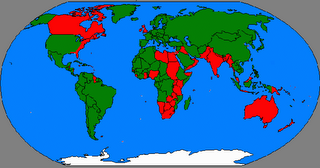 Richard Gott has always been a bit of a rancorous old leftie but his article today on the allegedly malign legacy of the British Empire is thought provoking. He argues that virtually all our annexations, impositions of settlers and other intervetions have resulted in ongoing suffering of a grievous kind. He cites Palestine where our casual dominion resulted in a form of settlement imposed by the west which he predicts will end with Israel being destroyed as a state. He surveys other examples of failure- Sierra Leone, South Africa, Zimbabwe, Kenya, where settlement has borne tragic outcomes; India, where partition caused enormous fatalities plus ongoing problems over Kashmir; Ceylon, where white owned plantations imported workers from India with dire present day consequences; and, of course, Iraq and Afghanistan.
Richard Gott has always been a bit of a rancorous old leftie but his article today on the allegedly malign legacy of the British Empire is thought provoking. He argues that virtually all our annexations, impositions of settlers and other intervetions have resulted in ongoing suffering of a grievous kind. He cites Palestine where our casual dominion resulted in a form of settlement imposed by the west which he predicts will end with Israel being destroyed as a state. He surveys other examples of failure- Sierra Leone, South Africa, Zimbabwe, Kenya, where settlement has borne tragic outcomes; India, where partition caused enormous fatalities plus ongoing problems over Kashmir; Ceylon, where white owned plantations imported workers from India with dire present day consequences; and, of course, Iraq and Afghanistan. In Iraq we absurdly sought to create a nation out of incompatible elements which now engage in murderous civil conflict and in Afghanistan we see the 'fourth Anglo-Afghan war in progress to be followed, as before, by an Afghan triumph'. He concludes:
'It seems that the story of Empire is being re-enacted over much of the globe, bringing violence and destruction on a scale barely envisaged in the imperial era.'
Against this it could be adduced that the empire has not rained devastation upon countries like Australia or Canada and that India, for one, has derived huge benefits from British occupation in terms of honest government, education and infrastructure. One leading historian, Niall Ferguson, has also argued that the empire provided the template for the better aspects of the modern world, like free trade and internatial law and that by being 'sacrificed' by Churchill in exchange for victory in the Second World War, it effectively saved the world from Nazism. I'm unsure about this argument however, and I look not only at the huge suffering our imperial adventures caused but also the deforming impact of its legacy of racism not to mention the occasions, as Gott has indicated, where the empire has struck back to provide something which seems like an avenging moral symmetry. But the argument is important, not just between historians but in the present day as well.
Friday, July 21, 2006
Why Can't we Support a Ceasefire?
 The Indie's practice of turning it's front page, tabloid style, into an editorial is not always effective. But today it pulls off something quite dramatic. Asking 'Who Backs Immediate Ceasefire?' it shows the massed flags of those in the UN who are on the lefthand side of the page while the righthand side contains the flags only of Israel, UK and USA. Meanwhile inside the implacable Robert Fisk tells us that 'This is not Dunkirk. This is Munich'. His argument, of course, is that Margaret Beckett's disingenuous refusal to urge restraint on Israel, is effectively to appease Ehud Olmert, a man whom we hoped- naive fools that we are- would be less prone to extravagant retaliation than his predecessor.
The Indie's practice of turning it's front page, tabloid style, into an editorial is not always effective. But today it pulls off something quite dramatic. Asking 'Who Backs Immediate Ceasefire?' it shows the massed flags of those in the UN who are on the lefthand side of the page while the righthand side contains the flags only of Israel, UK and USA. Meanwhile inside the implacable Robert Fisk tells us that 'This is not Dunkirk. This is Munich'. His argument, of course, is that Margaret Beckett's disingenuous refusal to urge restraint on Israel, is effectively to appease Ehud Olmert, a man whom we hoped- naive fools that we are- would be less prone to extravagant retaliation than his predecessor. That Hezbollah provoked this episode is beyond dispute; their killing of 8 Israeli soldiers was possibly prompted by Syria and/or Iran but it was bound to provoke an Israeli onslaught. But the aerial bombardment which has followed has killed nearly 400 civilians and destroyed hundreds of homes as well as much of Lebanon's infrastructure. The terrorist organization has responded to the dispute it started by drawing on its substantial supplies of rockets but the disproportion of Israeli reaction is palpable for the world to see and the victims are mostly innocent bystanders- hence the massive call for the cease-fire. Bush,in thrall to the powerful US pro Zionist lobby- seems to be standing aside while Israel looks for the killer punch- something which will almost certainly never be found- while Blair performs his usual shameful contortions as the Organ grinder's monkey and Beckett does the same in relation to him.
Thursday, July 20, 2006
Why Don't we Believe Crime is Falling?
 One of the most disbelieving reactions to official figures is elicited, in my experience, when government figures for crime are discussed. According to the latest figures, serious crime in England and Wales peaked in 1995 and is now down 44% in ten years. Jon Simmons, Head of Home Office Research and Statistics complains that 'comparatively high proportions of people still believe the crime rate to have risen. This is not true.' Polly Toynbee on Any Questions last week drew the same reaction from the audience and fellow panellists when she asserted this fact. I get the same thing in the pub and when talking to people who live close to me.
One of the most disbelieving reactions to official figures is elicited, in my experience, when government figures for crime are discussed. According to the latest figures, serious crime in England and Wales peaked in 1995 and is now down 44% in ten years. Jon Simmons, Head of Home Office Research and Statistics complains that 'comparatively high proportions of people still believe the crime rate to have risen. This is not true.' Polly Toynbee on Any Questions last week drew the same reaction from the audience and fellow panellists when she asserted this fact. I get the same thing in the pub and when talking to people who live close to me. The average home is now likely to be burgled once every 50 years compared with once every 25 years in 1995. But there is a confusing contradiction in the figures in that fear of crime has fallen steadily since crime figures began to fall; now only 13% say they are scared of burglary or car crime. If people have become less worried, then why do such high percenges insist we are still in the middle of a crime wave? One clue is provided by the papers people read. Tabloids love to splash front page stories about old people being beaten up when the actual incidence of such crimes is very rare. I suppose it's because we rather like to be horrified and to roundly condemn and tabloid editors have antennae well attuned to such likes.
It should not surprise us therefore that readers of such sources, according to Simmons, 'are twice as likely [39%] as those who read broadshetts[19%] to think that the national crime rate has increased "a lot" in the pevious year'. Twas ever thus I suppose and politicians bemoaning the press is, as someone once said, like sailors complaining about the sea. Maybe it just takes time for public attitudes to catch up with social reality but it's just yet another critical political problem for the beleagured Home Office to have cope with. Crime is one of the one or two most highly rated problems indicated by voters in surveys but it seems huge public expenditures can produce results only for no-one to believe them.
Wednesday, July 19, 2006
Whatever Happened to the Class War?
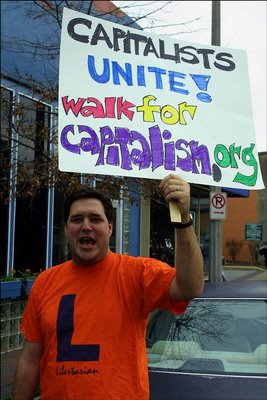 Two related articles in the Guardian today tell us much more about the state of political funding and Labour's related policy directions. David Hencke tells that both parties are heavily in debt after spending £30m on last year's election. Labour now owes £27m and the Tories £18m and both 'are being kept afloat by millionaires who have lent parties alost £30m on favourable terms and are not expecting to be paid back immediately.'
Two related articles in the Guardian today tell us much more about the state of political funding and Labour's related policy directions. David Hencke tells that both parties are heavily in debt after spending £30m on last year's election. Labour now owes £27m and the Tories £18m and both 'are being kept afloat by millionaires who have lent parties alost £30m on favourable terms and are not expecting to be paid back immediately.'Peter Wilby however provides some fascinating deeper analysis. He notes a tipping point in the 2001 election when business contributions to Labour's campaign exceeded donations from the unions. The payback, he suggests has been in the coin of ways of rendering far more money out of public services than the Conservatives could ever have contrived through market solutions. PFI offers private capital a 'guaranteed income stream for running(public) services over 20 to 30 years.
So lucrative and risk-free are these deals that many companies that entered early PFI contracts could refinance their borrowings at much lower rates of interest, thus boosting profits to stratosperic levels' [in some cases over 100% returns] Wilby points out that capitalists of even the reddest tooth and claw could not have dreamed of doing so well out of setting up schools and hospitals in a 'genuinely open and competitive market with all its risks of failure.'
Furthermore huge sections of public service management have been virtually handed over to consultants at a sky-high cost of £70bn. 'Given' comments Wilby, 'how Labour has turned the public services into a cash cow for the private companies, there was never much need to sell peerages.' Wilby doubts if union power-even in the mid seventies- exerted much political power beyond employment law but asks, pertinently, why it is possible for a non British citizen, like Rupert Murdoch, 'to dictate government policy, but not acceptable for the representatives of millions of employees to be heard?'
Tuesday, July 18, 2006
'Yo Blair' says it all
 That overheard conversation between George and Tony seems to sum up the one-sided relationship for me. Jonathan Freedland in the Guardian today does a neat deconstruction job which helps elucidate the exchange. My own reading prompts one or two additional points:
That overheard conversation between George and Tony seems to sum up the one-sided relationship for me. Jonathan Freedland in the Guardian today does a neat deconstruction job which helps elucidate the exchange. My own reading prompts one or two additional points:1. The form of address definitely seems patronizing; Freedland even discerns a hint of 'fratboy bullying'. Whatever happened to their first name relationship? Has familiarity so quickly bred so much contempt?
2. How come Blair does not use any form of address when speaking to Bush? He is disrespected by the surname only use but seems to be too awed by the most world's most powerful man to find any 'George' or even 'Mr President' in his personal lexicon.
3. Blair seems desperate to please, to do something for the leader of the western world- just like he trawled the world for him seeking that UN mandate before the invasion of Iraq.
4. Blair also seems nervous, tongue tied, as if he's a bit thrown to be speaking to such a mighty personage.
The whole conversation resembles one between a master and a servant. And giving Bush a personal gift- a sweater it would seem- simply adds to the humiliation. Blair is demeaned by it and, as citizens of the country he is supposed to be representing in that G8 meeting, we are all demeaned. What an insight into how things really are!
Monday, July 17, 2006
Are Parties On The Way Out?
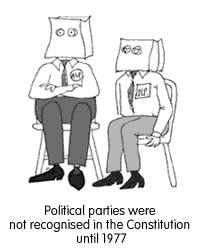 'The survival of political parties is now in doubt as much as Blair's' wrote the always interesting Michael Portillo yesterday in the Sunday Times. His argument is that their sources of funding have progressively dried up: subscriptions as voters have ceased to join parties for social reasons; company donations banned; rich donors(which this scandal will probably outlaw); and trade union donations which the Conservatives will ban when and if they acquire power. Portillo expresses his personal distaste for state funding of parties-'a dreadful idea'- and speculates that any PM would struggle to introduce such a measure while the present disaffected climate persists. Few would argue with that.
'The survival of political parties is now in doubt as much as Blair's' wrote the always interesting Michael Portillo yesterday in the Sunday Times. His argument is that their sources of funding have progressively dried up: subscriptions as voters have ceased to join parties for social reasons; company donations banned; rich donors(which this scandal will probably outlaw); and trade union donations which the Conservatives will ban when and if they acquire power. Portillo expresses his personal distaste for state funding of parties-'a dreadful idea'- and speculates that any PM would struggle to introduce such a measure while the present disaffected climate persists. Few would argue with that.He then suggests that the big parties might go bankrupt; adding that the reinvention of both big parties over the last decade or more provides evidence that they are, to borrow a phrase, 'not fit for purpose'. Portillo goes on to envisage politics without parties- something which might 'bring joy to an embittered electorate' and lead to a 'government made up of independent MPs.' This would work because 'the people in office have little need of parties. They can use the full aparatus of the state to promote their political objectives'. But whilst political parties- so long unrecognized constitutionally- might atrophy through lack of funding, one assumes the basic constitution would survive and that majorities in the legislature would determine the law.
This would certainly make it more difficult for governments to be voted out as clarity of choice would be lost. But I'm sure that after only a very brief-though dangerous- period, new parties- perhaps better attuned to our changed times- would emerge to contest the power to govern. Maybe such a genuine 'breaking of the mould' experience -unlike the one anticpated by the SDP in the eighties- would do us a power of good, but I suspect that well before such a situation state funding will have arrivedlike the cavalry to relieve the beseiged fort of democratic government.
Sunday, July 16, 2006
Sleaze-Busters Closing In

We've been told for some time about the Loans for Coronets 'time-bomb' ticking away underneath Blair's residence in Downing St, but it's been a surprise-to me at least- to realise how close to actual detonation time we've come. John Major, on the Andrew Marr programme this morning, was keen to make the point that his government was never involved directly in anything shady- it was merely peripheral figures, mostly backbenchers whose feet got stuck in the quagmire. But, this time, with Labour, the trail leads right up to the knocker on the PM's door.
Nick Cohen, in the Observer today provides an interesting angle on the saga. It was the SNP MP, Angus McNeil, of course, who first started asking questions about the close correlation between the giving off cash to parties and the receipt of honours. He found, however, that this association was wholly accepted by old parliamentary hands and that Geoff Hoon treated Alex Salmond's remonstrations on the subject with dismissive contempt. The actual legality of such practices seemed to have been forgotten. 'Fizzing with rage' McNeil checked in the Commons Library that the Honours(Prevention of Abuses) Act 1925 outlaws-on pain of prison- what has subsequently been commonplace in our politics. When the Met decided to investigate his complaint it was their first ever foray into political corruption. Which is such very bad news for Tony Blair.
We all know he's keen to stay in power to burnish his legacy; but already it looks way beyond the ministrations of any polish on the market. DAC John Yates has already interviewed nearly fifty people over the last few weeks -perhaps the furore over Prescott has helped keep the issue just below the radar- but it's been the arrest of Lord Levy which, according to Andrew Rawnsley which has shaken Number 10 to its foundations. Levy is widely seen as Blair's personal friend and instrument; it is inconceivable he could have done anything without the PM's blessing. What is more, he's let it be known that he'll not be a scapegoat; according to him, it was Blair who sanctioned the £14m of loans to finance the 2005 election. If Blair is arrested, his survival will be impossible. Political Betting report the best bookie price on him surviving the year is a mere 5/2
If he does indeed fall in this way, the irony will be that (even Honest) John Major and virtually every other PM since Robert Walpole, used the honours system to win political advantage but got away with it. Given the fact that Blair should have resigned after Hutton, I would see such outcome as no more than a re-assertion of natural justice.
Saturday, July 15, 2006
ID Cards latest policy area destined to go pear-shaped

Strange how when things go bad, they can really go pear shaped. Just look at ID Cards in the last Sunday Times. According to leaked emails from top Whitehall officials, the scheme 'is set to fail and may not be introduced for a generation'. The cards idea first appeared on the radar in 2002 when Blunkett announced a £1billion scheme to deter fraud and terrorism. Instead of dropping the scheme as some had urged it was re-introduced after the election in 2005 and beefed up to include biometric information. David Davis, the Conservative Shadow Home Secretary, posed four pertinent tests of the scheme in June 2005:
i) will it achieve its stated goals? Whilst it would certainly help against fraud, few believed it would deter terrorists like those responsible for the 7-7 explosions.
ii)is the government capable of introducing such a system? Given the abysmal record of the government in trying to make major IT schemes work in respect of the NHS, Criminal Records and many other departments, this would seem to be highly questionable.
iii) is it cost efective? Whilst the government calculated the coast would be £6bn, a careful LSE study produced figures of £19-24 bn. The government rejected such costings but refused to provide detailed costings of its own.
iv) can civil liberties be protected? In June 2004 the Information Commissioner Richard Thomas tols the Home Affairs Committee that he was 'increasingly alarmed' by the plan for which he did not see a 'sufficient rationale' for recording the whole population's name, address, date of birth, gender, nationality plus biometric details from finger and eye scans.
OK, these questions were put by the Oppostion but the answers have been provided here, substantially, by me. ID Cards are expensive, riskily experimental and a violation of civil liberties. I'm afraid this is yet another example of a bad idea being persevered with through the mistaken desire of the Prime Minister to leave a lasting legacy. The sooner it is abandoned the better; but I fear it won't be.
Friday, July 14, 2006
Political Funding

 Jack Straw, who clearly aims to be a reforming Leader of the House, recently gave a lecture to the Fabian Society on reforming the funding of political parties. This part of the political system is currently in a downward spiral: as members drift away, parties lose the subscription finance to fund activities (which currently cost around £20m a year even with no major election spending.) Consquently they look to individual donors to give or loan large sums and then both parties get caught out: Tories through dodgy donors and Labour through(alleged) loans for peerages.
Jack Straw, who clearly aims to be a reforming Leader of the House, recently gave a lecture to the Fabian Society on reforming the funding of political parties. This part of the political system is currently in a downward spiral: as members drift away, parties lose the subscription finance to fund activities (which currently cost around £20m a year even with no major election spending.) Consquently they look to individual donors to give or loan large sums and then both parties get caught out: Tories through dodgy donors and Labour through(alleged) loans for peerages.Straw favours a cap on spending which sounds sensible but a number of intractable problems remain to be solved. Firstly the flow of funds to Labour from union members. Labour is maintaining these are individual contributions while Conservatives insist they are no such thing. Secondly there is the practice, used by the Tories of channelling funds from wealthy private donors- Lord Ashcroft was involved before the last election-to individual constituencies to transform the level of minimum support for sometime, maybe years before the election campaign gets under way. This was done with some success by the Tories nbeore the last election. Third there is the question of government finance for political parties, as practiced in many other democracies in Europe and the USA. Many people are against this as violating the whole idea of a voluntary democracy and as treating the symptoms of disaffection instead of its causes.
To these problems I would favour: keeping the unions as contributors to Labour; controlling the flow of money to constituencies between elections; and introducing only very gradually small amounts of public funding of the parties. This last is a necessary evil as the patient is close to dying from the symptoms which must be alleviated as a matter of urgency. My worry with this however, as indeed with all controls, is that US experience has shown that there are myriad ways of evading such rules. So we see a well funded 'independent' body springing up during the last presidential campaign to 'tell the truth' about John Kerry's role in the 'Swift Boats' incident in Vietnam on which his claims of heroism rested. In reality this was a Republican funded scam to sully the democrat contender's reputation. However sophisticated the controls clever lawyers it seems can cicumvent them. Fortunately we do not include political advertising in our political culture- and long may this continue- but I suspect if controls on spending are too stringent, we might begin to see elements of US practice emulated over here. And I believe that could only be to the detriment of our political system.
Monday, July 10, 2006
This Prezza Problem is now Urgent

What to do with John Prescott is now an unrgent problem which ideally must be solved in the next few weeks. Simon Jenkins in the Sunday Times yesterday dismisses the political role Prescott has played as the proletarian fig leaf saving the rightward leaning immodesty of New Labour. That was a historical role; for him the key factor is the DPM's proven incompetence. He points out that before coming to power Blair did not welcome the former ship's steward into his inner circle but kept him at arm's length as a useful jester figure about whose lovability they could joke (e.g. 'John is John' Alastair Campbell smiles with mock exasperation in one documentary). Once in office Prescott was rewarded with a huge department covering most aspects of the nation's environment. And he could not cope. Brave words about transport, among other things, came to nought and bit by bit his portfolio was dismantled. This seems to have become the model of his ministerial career with the last bout of dismantling robbing the Hull MP of any residual departmental responsibilities.
Given all the failures in office plus the humiliations over his affair-not to mention speculation about several others- and now these allegations over favours in exchange for helping the billionaire US casino boss to turn the Millennium Dome into a temple to gambling, the man has no shred of credibility or authority left. Jackie Ashley pleads for him to go in today's article and for an open contest to be allowed for the Deputy Leadership of the party in an attempt to encourage the green shots of renewal in the party.
What is absolutely crystal clear is that there is no way Tony Blair should allow John Prescott to stand in for him in charge of the country while on holiday during August. He should remember that shit happens in holiday months too and that he is unlikely to be able to relax while wondering what daily disasters might have happened while his lugubrious deputy is in charge.
Sunday, July 09, 2006
Tory attacks on Brown's Scottishness could really hurt
 I kind of expected a surge of pro English feeling in the wake of our ignominious exit from the World Cup. All that red cross flag hoopla combining with resentful disappointment was bound to boost support for a separate English Parliament. Clearly fearing being overidentified with his own quintessentially Scottish origins, Gordon Brown has engaged in a pathetic attempt to be seen as rallying support for Britishness at least, if not Englishness. Few have been or will be convinced.
I kind of expected a surge of pro English feeling in the wake of our ignominious exit from the World Cup. All that red cross flag hoopla combining with resentful disappointment was bound to boost support for a separate English Parliament. Clearly fearing being overidentified with his own quintessentially Scottish origins, Gordon Brown has engaged in a pathetic attempt to be seen as rallying support for Britishness at least, if not Englishness. Few have been or will be convinced. But this is not unimportant for Brown. The Tories have included English votes for English issues in their last two manifestos and seem well set to run strongly with it in the lead up to the next election. If they can manage to change the political weather on the issue-and I think they just could- Brown might be trying to convince a country to vote for him which has already decided they cannot do so. Imagine the purchase the Tories could achieve by attacking- in the most subtle and not too obvious way, of course-Brown's palpable, almost lugubrious Scottishness. Party leaders would have to couch their attacks in the most subtle and non obvious ways, but their outriders in the press and elsewhere would be free to invoke any amount of ridicule and resentment against the Scots and the better deal received north of the border from the public purse.
A political war over the break up of the united Kingdom- more or less embraced by Michael Portillo I note- could set up an election in 2009 which Brown would be very hard pressed to win. And whilst someone like Tony Blair- born in Edinburgh so technically a Scot as well- is capable of turning aside such a campaign, I'm by no means sure the less fleet of tongue son of the manse is equally well equipped.
Saturday, July 08, 2006
Of Fat Tories and Eastern Europe


I've been impressed by the writing of Lucy Mangan, the razor sharp hackette who writes for the Guardian. Her Saturday diary piece today on the Conservative's summer party is wonderfully and wittily bitchy. The picture of Nicolas 'Fatty' Soames is hilarious(Couldn't trace it so I've had to poach another one I fear) and makes one wonder why the Tories vilify and taunt the girth of Prezza when they have such a bumper sized politico bulging in their own ranks. She mentions the parading 'phalanx of models' competing in the swim-suit fashion show, one of whom had only been in London for a month since leaving the Ukraine.
'Once upon a time,' she writes, 'the Tory party used to invite East European politicians to sit on the rostrum near Mrs Thatcher and celebrate the fall of communism. Now they invite Tatiana to come and get their tits out for the lads at the market rate. Welcome to western capitalism and the opportunities it offers to be ogled by Fatty Soames!.
This reminds me of one of my favourite sayings by that grand old Tory, Harold Macmillan. Once during the 80s -reflecting only approximately on the origins of the likes of Lawson, Brittan and Rifkind- he complained that 'Once upon a time most of the Conservative Cabinet used to originate Eton but now they come from Estonia.' And, unlike David Cameron, Macmillan did not have to have his witticisms conceived and written for him.
Friday, July 07, 2006
New Labour Plumbs New Lows with Prezza


Call me old fashioned but I never thought I'd see the party I've supported all my life surrender so totally to those forces of Mammon it was established to resist over a hundred years ago. According to Simon Jenkins New Labour was targetted by $100m lobbying campaign by big casino interests as it was considered more likely to roll over than those other European governments which have steadfastly refused to let the mega-gamblers in. Compulsive gambling is as addictive and destructive as alcoholism and it is well known that they and their familes are the first to suffer in areas where such establishments are set up.
One might have expected one of the only two working class representatives in the Cabinet, to have considered the interests of vulnerable mebers of their own class rather than the monied high rollers who can take the hits without collateral family damage. Instead, it seems Prescott has cosied up to this Anschutz and has been so keen to take his shilling that he expects us to believe his seven meetings have dealt with the likes of a shared interest in Willaim Wilberforce(Anschutz and his boys must be smirking over that one)and Prezza's childhood interest in the wild west. The Guardian leader expresses its own disillusionment with the DPM today with a broadside against 'a hollow man and an empty tent'.
We are also expected to believe that not once did the meetings touch on the topic most important to the billionaire: the future of his casino project. And whilst on the subject of the guy- something which, surprisingly, has not been so far raised- aren't gambling tycoons usually mixed up in organized crime? Finally, is Tony really content that a country studded with huge betting palaces close to our major cities is going to provide a highly visible part of his precious legacy?
Thursday, July 06, 2006
Why Americans Think They are at War and we Don't

An American writing in our press today exhorts us to exercise our democratic rights or see them wither. To be sure that million plus demo against the war back on 15 February 2003 did not stop the invasion but its impact is still being felt, mostly by Tony Blair, who's authority has been so sapped by his wilful rejection of that message. There is still every reason, when the need arises, to chalk up placards and make your views known out on the street. In the US ant-war sentiment was less widespread and, indeed, as the superb Timothy Garton-Ash today tells us has been usurped by the official US pro-war rhetoric into which only Blair seems to buy on this side of the Atlantic.
His main observation is that the American attitude is redolent of the 'honour', 'patriotism' and 'heroism' which can be found in Europe only pre 1914. 'Why is it' he asks, that the United States, which has not suffered a major terrorist attack at home for more than four years, thinks it's at war, while the United Kingdom, which was hit by a major terrorist attack just a year ago, does not?' He goes on to describe US bookstores' special offers entitled: 'Salute our heroes: 20% off Patriotic Titles' and how Bush talks, amazingly still, of 'accepting nothing less than complete victory'. Along with his compatriots, Bush has a long wait for that to arrive.
Why should there be such a difference in attitude? TGA suggests it's in the political culture. 'Unlike many continental Europeans, most of us do not rule out war as a means of last resort. We think you sometimes need to defend your way of life, but that you should fight clever, keeping a cool head, a strong sense of proportion. We've lived with terrorism for years and know you can lick it, especially if you don't overreact and and make unnecessary sacrifices of liberty in the name of security- for freedom is its own best defence. Between cheese eating surrender monkeys and fire-eating war junkies, we look for a middle way.'
What TGA doesn't quite acknowledge is that it's the same cloth-eared Blair who has somehow managed to preside over the survival of this more realistic and discriminating approach. I feel sure that that demo, and others like it, four years ago has helped substantially in that process.
Wednesday, July 05, 2006
Campbell's Superior Answer for Iraq
 Ming Campbell's 'rehabilitation' as leader of the Lib Dems(after so short a time in office this seems a strange word to use) continues with his powerful article in the Guardian today. Some criticsare saying Ming is focusing on foreign affairs because he lacks any touch on domestic issues; but even if this is so, this charter for bringing some order to the devastation is to be welcomed, if only through the absence of realistic thinking by the government.
Ming Campbell's 'rehabilitation' as leader of the Lib Dems(after so short a time in office this seems a strange word to use) continues with his powerful article in the Guardian today. Some criticsare saying Ming is focusing on foreign affairs because he lacks any touch on domestic issues; but even if this is so, this charter for bringing some order to the devastation is to be welcomed, if only through the absence of realistic thinking by the government.Ming points out that there has not been a debate on Iraq since July 2004 and before that March 2003. The government seems to be deliberately keeping th topic under wraps for fear of the punishing criticism it's likely to receive. He rightly suggests that after the implosion of unilateralism US style, echoed by usasole supporting cast, a multilateral approach is the only way out. Anything mooted by the US-UK will seem tainted from the outset and will not command Iraqi support. He proposes starting with a 'regional contact group' to ensure contiguous powers are onside in future moves. 60 per cent of Iraqis think the UN should lead future moves to achieve peace in this benighted country and so, whatever John Bolton might think, it is the UN which should take the lead.
Campbell adds other steps on training and professionalizing Iraqi security staff, ending the detention of suspects on the present indefinite basis and planning a withdrawal of occupying forces on a phased timetable. This sounds a much more hopeful prospectus for progress in Iraq than anything the government has so far come up with. Whatever touch New Labour had with foreign affairs- as it seemed to have when Cook was in charge- appears to have disappeared. The government is desperately in need of a new strategy; Ming Campbell's reformulated approach merits serious consideration. And whilst at it, Margaret Beckett should read the corruscating critique of policy in Afghanistan by Simon Jenkins in the same issue. No question The Guardian's columnists are currently the best among the quality dailies.
Tuesday, July 04, 2006
Simpson not up to Lloyd George's Standard
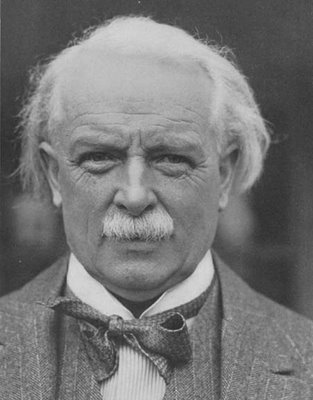
The political insult was an art I thought was in decline until I heard of Alan Simpson's quip that choosing between Blair and Brown was like choosing 'between Saddam Hussein and his son Uday.' Inevitably, being so rude about two of the schoolmasters has earned rebuke and it seems Chief Whip Jacqui Smith, is soon to roll out a disciplinary code that would allow her to suspend members guilty of such insubordination.
Given our adversarial system and political culture it would be foolish to ban political insults. I would suggest instead that MPs should be reprimanded if their efforts turn out to be too feeble- for example, Cameron's creaky sally about Blair being the 'David Brent of British politics' It's not at all like the old days of Disraeli or FE Smith when they really knew how to hone the insults. Lloyd George for example said of two leading French politicians: 'Poincare knows everything and understands nothing- Briand understands everything and knows nothing.' Or Herbert Asquith's wife Margot's reply to Jean Harlow when asked about the pronunciation of her Christian name: 'The T is silent - as in Harlow.' OK, that's not really a political insult so here's my favourite(and cruellest) one, again by LG: he said of fellow Liberal Herbert Samuel, 'When they circumcised him, they threw away the wrong bit.'
Monday, July 03, 2006
'Great Game' still offers no winners
 I've always felt a bit foolish about my views on the war in Afghanistan. Back in October 2001, on the eve of the US-UK attempt to avenge 9-11 by wiping out the Taliban in general and Bin Laden in particular I was opposed to the whole enterprise. I was appalled by the attack on the twin towers and expected the US to indulge in retaliatory actions but I was very worried at the decision to target the land of the Khyber Pass.
I've always felt a bit foolish about my views on the war in Afghanistan. Back in October 2001, on the eve of the US-UK attempt to avenge 9-11 by wiping out the Taliban in general and Bin Laden in particular I was opposed to the whole enterprise. I was appalled by the attack on the twin towers and expected the US to indulge in retaliatory actions but I was very worried at the decision to target the land of the Khyber Pass.The local radio, GMR, asked me to do an interview on the issue of the day and I duly sat in the studio warning of the dire dangers of intervention; the breaching of the normal rule that nation states hold back from intervening in the internal affairs of others. Warming to my theme I pointed out that every invader of this mountainous, inhospitable country- Aryans, Macedonians, Greeks,Russians, Britons, the USSR- had found after a few years that they had to withdraw with ignominy. The Great Game fought by Russia and Britain to dominate this crossroads country produced no winner(on this see here). On balance, I confidently asserted, this was a bad move which we would come bitterly to regret. Then came the invasion and the deceptively easy victory over the Taliban forces by western forces in alliance with the Northern Alliance culminating in the enthonement of that nice Mr Karzai with his fashionable green cape and I began to think I was out of touch with the modern world.
I was pleased so few listen to GMR and was even mildly optimistic at the outset that the invasion of Iraq would prove similarily successful. But now I feel my doubts were all too well founded. It is generally better to stay out of other peoples' fights, especially Middle Eastern ones. And the curse of Afghanistan appears to be returning. Our 3000 plus troops, recently sent in to help fight the resurgent Taliban, may find they are faced with a slow death by bleeding over an indefinite period. William Hague is quite right to question the rationale for our troops deployed in this unhappy region. His questions focus on how self defeating is our effort to win hearts and minds when we propose at the same time to curtail their chief source of income: poppy cultivation for the production of opium.
Des Browne and Margaret Beckett insist we are merely 'peace-keeping' in response to the government in Kabul but we all know it is Washington from where the real invitation came. Like US-UK troops in Iraq our boys are now trapped in a fearsome place with little hope of any early return ticket. Nobody is talking about exit strategies yet but I wager it will only take a few more deaths and as many months before this issue tops the 'permanent crisis' agenda along with Iraq.
Sunday, July 02, 2006
English Votes for English Issues would wreck UK Parliament
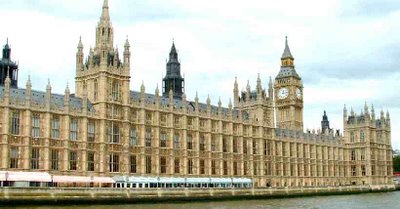 According to the Observer today the Tories are arguing Scottish MPs should be barred from voting on English issues. As they cannot make this a reality until 2009 and then only with a majority, this might seem academic. But raising the topic draws attention to Gordon's palpable non Englishness and breathes a little more on the potential fire of a backlash against the £1000 plus per capita of public spending Scotland receives from the public purse compared with England. At first glance it seems an easy answer- always a hugely seductive attraction for any policy-to the vexed West Lothian Question, the unfair advantage whereby Scots MPs can vote on English domestic issues but English MPs, not (because of devolution) the vice versa. But would it work?
According to the Observer today the Tories are arguing Scottish MPs should be barred from voting on English issues. As they cannot make this a reality until 2009 and then only with a majority, this might seem academic. But raising the topic draws attention to Gordon's palpable non Englishness and breathes a little more on the potential fire of a backlash against the £1000 plus per capita of public spending Scotland receives from the public purse compared with England. At first glance it seems an easy answer- always a hugely seductive attraction for any policy-to the vexed West Lothian Question, the unfair advantage whereby Scots MPs can vote on English domestic issues but English MPs, not (because of devolution) the vice versa. But would it work?Ken Clarke, chair of the Conservatives' Democracy study group, seems to think so not to mention the redoubtable members of the Campaign for an English Parliament'CEP'(currently still draped in the St George's Cross). But, given the political advantage involved, they would wouldn't they? I am more persuaded by more nonpartisan analyses and that of Professor Robert Hazell, Director of the Constitution Unit at UCL, offers, in addition, the cool authority of a true expert in the field. He argues that while such an idea enjoys majority support, in England and in Scotland, it would carry with it grave problems for the working of Parliament.
It seems only logical and fair that Scottish MPs should no longer be allowed to vote on legislation purely affecting England, when English MPs can no longer vote on equivalent measures in Scotland. The former Conservative minister Kenneth Baker introduced a bill in the House of Lords that would achieve just that. But technically there is no such thing as an 'English law', and any Speaker's ruling on which votes should be English-only would be heavily contested.
Politically the difficulties would be even greater. It would create two classes of MP, and lead to potentially serious instability if the UK government could not command a majority for its English business. The idea would involve more than just a modest procedural change. Effectively it would create a parliament within a parliament, with an English parliament operating within the shell of Westminster.
To my mind, this would make the existing chamber virtually unworkable and effectively achieve the break-up of the United Kingdom. I suspect that maybe the Conservatives know this but that, for reasons of expedience, are keen to run with this ball as far as it will take them.
Saturday, July 01, 2006
Murdoch's Malign Influence
 I've sometimes wondered why, in the infinite plurality of history we've never had a leftwing media mogul. Pullitzer, Beaverbrook, Northcliffe, Hearst, Maxwell, all men well to the right. Of course, it would be odd if the business of publishing and selling newspapers produced someone dedicated to abolish the system bestowing such riches, status and influence. So what of the most powerful media mogul who has ever lived: Keith Rupert Murdoch II (75)? It seems he admired his newspaperman father but rebelled against him and perhaps as a reason inherited less than he expected- he had to be satisfied with merely the Adelaide News . But, as we all know, through acute business and journalistic skills he eventually converted this asset into a multi-million dollar empire, becoming the Chairman and MD of the News Corporation.
I've sometimes wondered why, in the infinite plurality of history we've never had a leftwing media mogul. Pullitzer, Beaverbrook, Northcliffe, Hearst, Maxwell, all men well to the right. Of course, it would be odd if the business of publishing and selling newspapers produced someone dedicated to abolish the system bestowing such riches, status and influence. So what of the most powerful media mogul who has ever lived: Keith Rupert Murdoch II (75)? It seems he admired his newspaperman father but rebelled against him and perhaps as a reason inherited less than he expected- he had to be satisfied with merely the Adelaide News . But, as we all know, through acute business and journalistic skills he eventually converted this asset into a multi-million dollar empire, becoming the Chairman and MD of the News Corporation. Interestingly, the fact that this monster of leftwing perception, was a Marxist while at Oxford, offers us the closest there is -or is likely to be- to a leftwing media magnate. Today, former Number Ten spin doctor, Lance Price, offers fascinating insights into the relationship between New Labour and the man who commands an automatic audience with Tony whenever his plane alights at Heathrow. Rupe has not become this media colossus without cutting a few corners. Changing his nationality to that of an American citizen simply to qualify for ownership of a TV channel in the US was just one example- one which, incidentally, calls into comical question his recent award as the 'most influential Australian of all time'.
Maintaining good relations with the locus of power in any country in which he operates is his inevitable modus operandi has seen his Fox News Channel in America resolutely support Bush, to the exclusion, claim his bitter critics, of any alternative point of view. He has also found it easy to do censor certain broadcasts to China at the behest of its insecure authoritarian rulers. So sensitive are his political antennae that any favour shown to a British party leader is immediately interpreted as a sign that that person is going to win the next election.
So in March 1997, Blair was chosen Major's heir apparent and, maybe now, he seems to have started the process of rejecting his surrogate political son and adopting another coming young tyro in the form of David Cameron. Price tells us that no big decision could be taken during his time in No 10 without Rupe's agreement and that his views on the EU effectively applied a veto on too close a relationship with Brussels. Price believes too much was given in terms of of policy infuence and scoops to Murdoch papers to justify the minuscule returns it receives from the grim faced Aussie, (or do I mean Yank?). In fact-years after Dennis Potter named his tumor after him, Rupert's influence has become a malign and undemocratic one. As Simon Jenkins argued recently, Blair has become a pathetic 'tabloid slave' and as Price argues today, Murdoch has become effectively an unelected and unaccountable 'member of Blair's cabinet'. The really bad news is that there is no sign this influence will decline in the foreseeable future.

